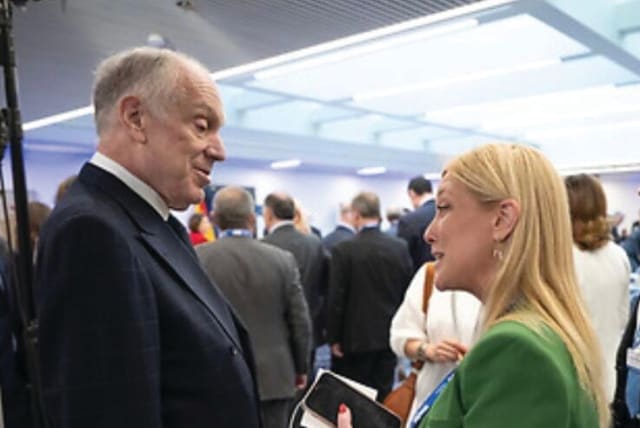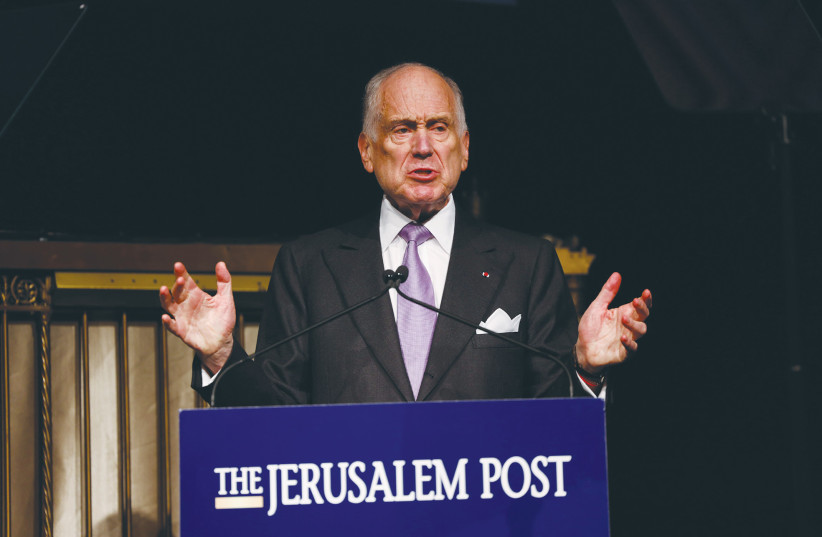Jews in Israel and world Jewry share the same destiny - opinion

We should seek to learn about, and comprehend, the wide variety of perceptions, differences in mentality and culture of the different Jewish communities throughout the world.
The World Jewish Congress was established in the 1930s. Its objective was clear – to unite Jewish communities throughout the world to try and influence decision-makers for the purpose of saving European Jewry from the rising antisemitism that was already then – prior to the outbreak of World War II – perceived as potentially deadly for the Jews.
In 1936, 230 representatives of Jewish communities from 32 countries met in Geneva. The American representatives were democratically elected, within the framework of a conference, in which no less than 1,000 candidates participated, from 99 Jewish communities throughout the United States of America.
The unity of the Jewish people was not a given and communities were not only scattered geographically but also in idea, thought and perception, ranging from progressive to very conservative. The sharp rise in antisemitism, particularly in Europe, and the fear for the lives of European Jews, was the glue that served to unite large segments of the Jewish World.
The Congress’s first steps did not contribute much to strengthening the idea of Jewish unity and did not achieve the sought-after results, despite endless efforts on behalf of the Jewish leadership of the communities and the organization.
The attempt to organize an international ban on Nazi merchandise failed. Democratic countries, and even some of the Jewish leaders in the United States and in Germany, did not quite comprehend at that time how severe the Nazi threat truly was. Even after Kristallnacht, the attempts by the World Jewish Congress to convince the American and other leaderships to open their borders to Jewish refugees from Europe achieved very limited success.
In August 1942, a representative of the World Jewish Congress handed the Allied Forces reliable information about the “Final Solution” concocted by the Nazis for what they termed as the “Jewish Problem.”
Yet the British Foreign Office and the American State Department chose to ignore the information. Even the attempts to deliver food packages and medicine to European Jewry via the Red Cross achieved very meager results.
Worst of all, the World Jewish Congress’s plea to the US State Department in August 1944 to bombard the gas chambers in Auschwitz was simply refused. It is thus easy to imagine that the relative failure of the aforementioned attempts would weaken the resolve of the Jewish leaderships and the World Jewish Congress, particularly given the news of the scope of the horrors that European and North African Jewry had faced and were still facing.
At one point in time, the-then leader of the World Jewish Congress solemnly described these failed attempts as an “awful and depressing episode in history, paved with disappointments and failures.... We all are guilty of these failures, some of us more and some of us less so, and I’m including myself as well.”
Yet, almost miraculously, not only did this not weaken the resolve of the World Jewish Congress and its leadership, it served to empower the attempts to save the remaining Jews and to rehabilitate the survivors. The unity, almost unprecedented and certainly not obvious in world Jewry, alongside the determination of the leaders of the World Jewish Congress at the time, as well as other organizations, were successfully translated into fundraising and meaningful influence over decision-makers for the purpose of forwarding the interests of the Jewish peoplehood at that point in history and since then.
What's happening today?
Currently, in the face of the sharp rise in antisemitism in Europe and in the US, the Congress and many other Jewish organs work relentlessly to mitigate and minimize this age-long phenomenon of bigotry and hatred. They also help Jewish communities with meager means throughout the world, strengthen Jewish culture and heritage and maintain a constant connection and bridge with Israel.
Israeli children, on the other hand, are mostly raised with little or no knowledge of this important aspect of “Jewish peoplehood.” While the connection between Israel and the Jewish Diaspora is a key element in the very resilience of the State of Israel, this linkage is not taught in Israeli schools and has not earned, until thus, its proper standing and respect amidst many of Israel’s politicians.
The State of Israel is undoubtedly the homeland as well as a potential sanctuary for every Jewish person throughout the world. History has taught us that lesson. One excellent recent example is the Russian-Ukrainian war, in which Jews – some of whom were Holocaust survivors – living in Ukraine and whose lives were in danger, were evacuated and brought to live and settle in Israel.
The Jewish Diaspora, in its part, is a meaningful and significant role player in issues pertaining to the very security and defense of the State of Israel, partly via its lobbying capabilities, but not only. Jewish communities are active in passing legislation that has much to do with mitigating antisemitism in different states throughout the US, shaming BDS activists, for instance, and most recently – Kanye West, and others and yet the symbiosis between Israeli and Diaspora Jewry is often misunderstood or not valued enough by Israeli decision-makers and Israeli citizens in general.
Often, Jews throughout the world, whether they like it or not, are perceived by their non-Jewish compatriots as connected to Israel. Each and every event that occurs in the Holy Land influences them and their lives almost on a daily basis.
When a Jew whispers the age-old prayer “Next year in Jerusalem,” it is not necessarily a practical longing, yet most certainly a symbolic need to maintain Jerusalem and Israel as a homeland for Jews throughout the world, and as the eternal sanctuary against bigotry, pogroms, hatred, antisemitism and centuries’-old persecution.
Perhaps at this particular point, when the chasm between Jews inside Israel is seemingly so enormous, we must try and learn from the success of the World Jewish Congress and the Jewish world in general during and particularly after the Holocaust, despite endless setbacks, differences of opinions and often even contradicting perceptions. We should learn from the aforementioned determination, despite many failures, and the choice to maintain Jewish unity in the face of the challenges faced by the Jewish people.
This is an important moment in the State of Israel’s history, on the eve of Passover, in which we are taught that our people were freed from slavery. It is a moment in which is will be key for us, in Israel, to understand that we must not remain slaves to old perceptions in which Israeli Jews and Diaspora Jews are two different entities.
Rather, we should seek to learn about, and comprehend, the wide variety of perceptions, differences in mentality and culture of the different Jewish communities throughout the world. We can do this even while also embracing the notion that we are part of one whole, and that the concern of many Jews throughout the world as per what is currently happening in Israel is an expression of that unity and of the understanding that we share the mutual destiny of one people.
The writer, a former MK, was the founder and co-chair of the first Abraham Accords Caucus in the Knesset. She has been appointed chairperson of the newly established Women’s Impact Forum of the World Jewish Congress.
Jerusalem Post Store
`; document.getElementById("linkPremium").innerHTML = cont; var divWithLink = document.getElementById("premium-link"); if (divWithLink !== null && divWithLink !== 'undefined') { divWithLink.style.border = "solid 1px #cb0f3e"; divWithLink.style.textAlign = "center"; divWithLink.style.marginBottom = "15px"; divWithLink.style.marginTop = "15px"; divWithLink.style.width = "100%"; divWithLink.style.backgroundColor = "#122952"; divWithLink.style.color = "#ffffff"; divWithLink.style.lineHeight = "1.5"; } } (function (v, i) { });

